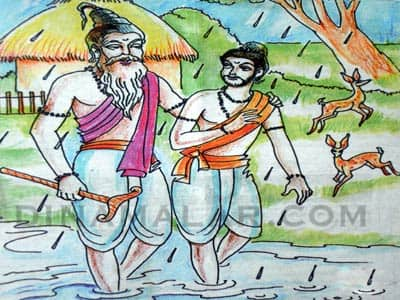மகாகவி பாரதியாரின் 134 வது
பிறந்தநாள் :இன்று
(தமிழன் என்று சொல்லடா தலை நிமிர்ந்து நில்லடா.)
"உச்சி மீது வானிடிந்து வீழுகின்ற போதிலும்
அச்சமில்லை அச்சமில்லை அச்சமென்பதில்லையே"
உச்சி மீது வானிடிந்து மழையாய் விழுந்த போதும், அச்சமின்றி களத்தில் இறங்கிய இளைஞர்கள் எத்தனை பேர்.
என்னை போல ஒரு சாதாரண நடுத்தர குடும்பத்தில் பிறந்த இளைஞர் யாராய் இருந்தாலும், அவரவர் வாழ்க்கை சக்கரத்தை சுழற்றி கொண்டு செல்லவே நேரம் சரியாக இருக்கும். இதில் சமூகம், அதை பற்றிய அக்கறை என்றெல்லாம் என்னை போன்றவர்கள் பெரிதாய் எடுத்துக் கொள்ள வாய்ப்புகள் இல்லை. இதை போன்ற இயற்கை சீற்றத்தினை நேரில் அனுபவிக்கும் போது தான் அந்த அக்கறை சிறிதளவாவது வந்து போகும். அப்படி இந்த இளைஞர்களுக்கு வந்து போன சமூக அக்கறையின் சிறிய வெளிபாடு தான் இன்று தமிழகம், சட்டென கண்ணிமைக்கும் நொடியில் மீண்டும் தன் வாழ்க்கை சக்கரத்தை சுழற்ற காரணமாயிற்று.
இரண்டு வருடங்கள் முன்பு நான் வீட்டை விட்டு கிளம்பி வந்த போது, என் கனவின் மேல் உள்ள பிடிவாதத்தின் காரணமாக ஒரு வேலை உணவிற்கே கஷ்டம். இந்த ஊரின் மேல் உள்ள நம்பிக்கையில் கிளம்பி வந்த என்னை போன்ற எத்தனையோ இளைஞர்களின் கனவிற்கு ஒரு அடையாளம் கொடுத்திருக்கிறது இந்த ஊர், இந்த சமூகம். எனக்கு இந்த அடையாளம் தந்த என் சமூகத்திற்கும், மொழிக்கும் திரும்ப எவ்வளவு செய்தாலும் அது ஈடாகாது. இருப்பினும் எங்களால் எதாவது செய்ய முடியும் என்று யோசித்ததின் விளைவு தான் எங்கள் " தமிழன்டா movement". இதற்கான வயதும், அனுபவமும் என்னிடம் இருக்கிறதா என்ற யோசனைக்கு நேரம் செலவிடுவதைவிட, இறங்கி வேலை செய்வதில் நேரம் செலவிடலாம்.
ஆகவே இதன் செயல்பாடுகள் மற்றும் களப்பணியின் விவரம் வெகு விரைவில் தெரிவிக்கப்படும். இருப்பினும், இதனது அறிவிப்பை எனது தலைவன் மகாகவி பாரதியின் 134வது பிறந்தநாளன்று செய்ய வேண்டும் என்பதற்கான பதிவே இது
பிறந்தநாள் :இன்று
(தமிழன் என்று சொல்லடா தலை நிமிர்ந்து நில்லடா.)
"உச்சி மீது வானிடிந்து வீழுகின்ற போதிலும்
அச்சமில்லை அச்சமில்லை அச்சமென்பதில்லையே"
உச்சி மீது வானிடிந்து மழையாய் விழுந்த போதும், அச்சமின்றி களத்தில் இறங்கிய இளைஞர்கள் எத்தனை பேர்.
என்னை போல ஒரு சாதாரண நடுத்தர குடும்பத்தில் பிறந்த இளைஞர் யாராய் இருந்தாலும், அவரவர் வாழ்க்கை சக்கரத்தை சுழற்றி கொண்டு செல்லவே நேரம் சரியாக இருக்கும். இதில் சமூகம், அதை பற்றிய அக்கறை என்றெல்லாம் என்னை போன்றவர்கள் பெரிதாய் எடுத்துக் கொள்ள வாய்ப்புகள் இல்லை. இதை போன்ற இயற்கை சீற்றத்தினை நேரில் அனுபவிக்கும் போது தான் அந்த அக்கறை சிறிதளவாவது வந்து போகும். அப்படி இந்த இளைஞர்களுக்கு வந்து போன சமூக அக்கறையின் சிறிய வெளிபாடு தான் இன்று தமிழகம், சட்டென கண்ணிமைக்கும் நொடியில் மீண்டும் தன் வாழ்க்கை சக்கரத்தை சுழற்ற காரணமாயிற்று.
இரண்டு வருடங்கள் முன்பு நான் வீட்டை விட்டு கிளம்பி வந்த போது, என் கனவின் மேல் உள்ள பிடிவாதத்தின் காரணமாக ஒரு வேலை உணவிற்கே கஷ்டம். இந்த ஊரின் மேல் உள்ள நம்பிக்கையில் கிளம்பி வந்த என்னை போன்ற எத்தனையோ இளைஞர்களின் கனவிற்கு ஒரு அடையாளம் கொடுத்திருக்கிறது இந்த ஊர், இந்த சமூகம். எனக்கு இந்த அடையாளம் தந்த என் சமூகத்திற்கும், மொழிக்கும் திரும்ப எவ்வளவு செய்தாலும் அது ஈடாகாது. இருப்பினும் எங்களால் எதாவது செய்ய முடியும் என்று யோசித்ததின் விளைவு தான் எங்கள் " தமிழன்டா movement". இதற்கான வயதும், அனுபவமும் என்னிடம் இருக்கிறதா என்ற யோசனைக்கு நேரம் செலவிடுவதைவிட, இறங்கி வேலை செய்வதில் நேரம் செலவிடலாம்.
ஆகவே இதன் செயல்பாடுகள் மற்றும் களப்பணியின் விவரம் வெகு விரைவில் தெரிவிக்கப்படும். இருப்பினும், இதனது அறிவிப்பை எனது தலைவன் மகாகவி பாரதியின் 134வது பிறந்தநாளன்று செய்ய வேண்டும் என்பதற்கான பதிவே இது
சுப்ரமணிய பாரதியார் ஒரு தமிழ் கவிஞர்.
இந்திய சுதந்திர போராட்ட காலத்தில் கனல் தெறிக்கும் விடுதலைப்போர் கவிதைகள்
வாயிலாக மக்களின் மனதில் விடுதலை உணர்வை ஊட்டியவர். இவர் ஒரு கவிஞர்
மட்டுமல்லாமல் ஒரு எழுத்தாளர், பத்திரிக்கையாசிரியர், சமூக
சீர்திருத்தவாதி மற்றும் தன்னுடைய பாட்டுகளின் மூலமாக சிந்தனைகளை மக்களிடம்
தட்டியெழுப்பியவர். தம் தாய்மொழியாம் தமிழ்மொழி மீது அளவுகடந்த
பற்றுக்கொண்ட இவர், “யாமறிந்த மொழிகளிலே தமிழ்மொழிபோல் இனிதாவதெங்கும்
காணோம்” என்று போற்றி பாடியுள்ளார். விடுதலைப் போராட்ட காலத்தில், இவருடைய
தேசிய உணர்வுள்ள பல்வேறு கவிதைகள் மக்களை ஒருங்கிணைத்த காரணத்தினால் “தேசிய
கவியாக” போற்றப்பட்ட மாபெரும் புரட்சி வீரனின் வாழ்க்கை வரலாறு மற்றும்
சாதனைகளை விரிவாகக் காண்போம்.
பிறப்பு: டிசம்பர் 11, 1882
பிறப்பிடம்: எட்டயபுரம், தமிழ்நாடு (இந்தியா)
பணி: கவிஞர், எழுத்தாளர், விடுதலை வீரர்
இறப்பு: செப்டம்பர் 11, 1921
நாட்டுரிமை: இந்தியா
பிறப்பு
சுப்ரமணிய பாரதியார் அவர்கள், சின்னசாமி
ஐயருக்கும், இலட்சுமி அம்மாளுக்கும் மகனாக 1882 ஆம் ஆண்டு தமிழ்நாட்டின்
திருநெல்வேலி மாவட்டத்திலுள்ள எட்டயபுரத்தில் பிறந்தார். அவருக்கு
பெற்றோர் இட்ட பெயர் சுப்பிரமணியன். அவருடைய 5 வயதில் அவருடைய தாயார்
காலமானார். இவர் இளம் வயதிலேயே தமிழில் புலமைப்பெற்றுத் திகழ்ந்தார்.
இளமைப் பருவம்
சிறு வயதிலேயே பாரதியாருக்கு தமிழ் மொழி
மீது சிறந்த பற்றும், புலமையும் இருந்தது. ஏழு வயதில் பள்ளியில்
படித்துவரும்பொழுது கவிதைகள் எழுதத் தொடங்கினார். தன்னுடைய பதினொரு வயதில்
கவிபாடும் ஆற்றலை வெளிப்படுத்தினார், இவருடைய கவிப்புலமையை பாராட்டிய
எட்டயபுர மன்னர், இவருக்கு “பாரதி” என்ற பட்டத்தை வழங்கினார். அன்று முதல் இவர் “சுப்பிரமணிய பாரதியார்” என அழைக்கப்பெற்றார்.
பாரதியாரின் இலக்கிய பணி
‘மீசை கவிஞன்’ என்றும் ‘முண்டாசு கவிஞன்’
என்றும் தமிழ் இலக்கிய உலகம் போற்றும் பாரதியார், தாய் மொழியாம் தமிழ்
மொழியின் மீது மிகுந்த பற்றுடையவராக திகழ்ந்தார். இவர் சமஸ்கிருதம்,
வங்காளம், இந்தி, ஆங்கிலம் போன்ற பிறமொழிகளிலும் தனி புலமைப்பெற்று
விளங்கினார். 1912 ஆம் ஆண்டு கீதையை தமிழில் மொழிப்பெயர்த்தார்.
‘கண்ணன்பாட்டு’, ‘குயில்பாட்டு’, ‘பாஞ்சாலி சபதம்’,’ புதிய ஆத்திச்சூடி’
போன்ற புகழ் பெற்ற காவியங்கள் பாரதியரால் எழுதப் பெற்றன.
விடுதலைப் போராட்டத்தில் பாரதியின் பங்கு
சுதந்திரப் போரில், பாரதியின் பாடல்கள்
உணர்ச்சி வெள்ளமாய், காட்டுத்தீயாய், சுதந்திரக் கனலாய் தமிழ்நாட்டை
வீருகொள்ளச் செய்தது. பாரதியார் “இந்திய பத்திரிக்கையின்” மூலம் மக்களிடையே
விடுதலை உணர்வை தூண்டும் வகையில் பல எழுச்சியூட்டும் கட்டுரைகளை
எழுதினார். பாரதியின் எழுச்சிக்கு, தமிழ்நாட்டில் பலத்த ஆதரவு பெருகுவதைக்
கண்ட பிரிட்டிஷ் ஆட்சி “இந்தியா பத்திரிக்கைக்கு” தடை விதித்து அவரை கைது
செய்து சிறையிலும் அடைத்தது. அதுமட்டுமல்லாமல், விடுதலைப் போராட்டக்
காலத்தில் தேசிய உணர்வுள்ள பல்வேறு கவிதைகளைப் படைத்து மக்களை ஒருங்கிணைத்த
காரணத்தால், பாரதி “தேசிய கவியாக” அனைவராலும் போற்றப்பட்டார். இவர்
சுதேசிமித்திரனில் உதவி ஆசிரியராக, நவம்பர் 1904 முதல் ஆகஸ்ட் 1906 வரை
பணியாற்றினார். “ஆடுவோமே பள்ளு பாடுவோமே ஆனந்த சுதந்திரம் அடைந்துவிட்டோம்”
என்று சுதந்திரம் அடைவதற்கு முன்பே தன்னுடைய சுதந்திர தாகத்தை தன்
பாட்டின் மூலம் வெளிபடுத்தியவர், மகாகவி சுப்பிரமணிய பாரதியார்.

